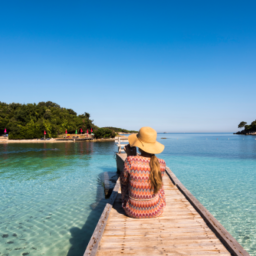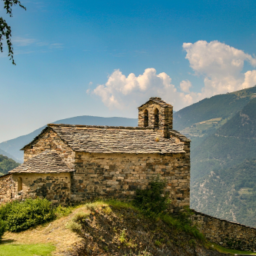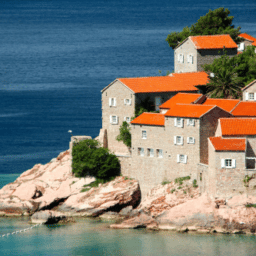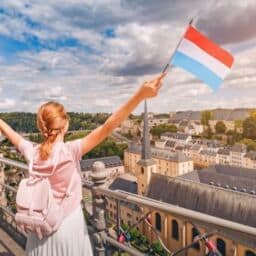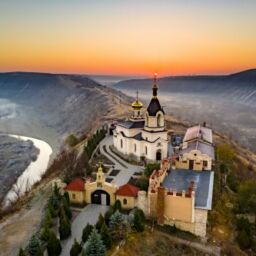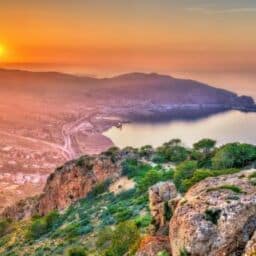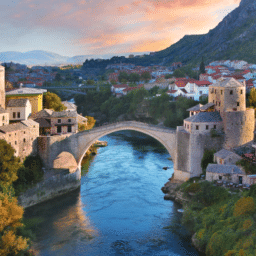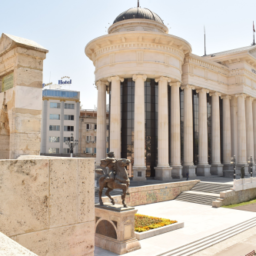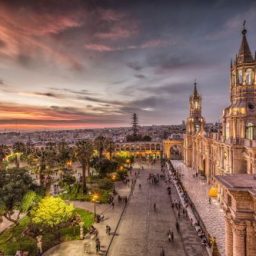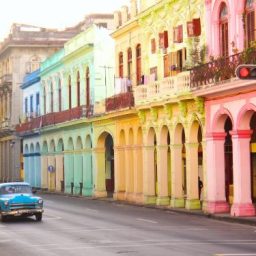
Georgia is a country which every year wins new tourists’ hearts, thanks to the legendary Georgian hospitality, aromatic cuisine and spectacular views. It has a lot to offer, let it delight you!
There is only one small inconvenience that you may encounter during your travels: the language barrier. The population of Georgia speaks mainly Georgian, which is considered a difficult language to learn for an English speaker (source: Georgia Today). It may not be easy to get around knowing only English. If you know a bit of Russian, use it to your advantage and equip yourself with a phrasebook.
Contents
Georgia in a nutshell
Georgia is a small country located in the Southern Caucasus, sandwiched between Europe and Asia. It shares land borders with Russia, Armenia, Azerbaijan, and Turkey. A considerable part of its territory lies in the mountains. The highest peak is Shkhara (5193 metres above sea level). Georgia has access to the Black Sea, its coast spreads over 310 kilometres. The country’s capital is Tbilisi. Other significant cities are Kutaisi, Poti and Batumi.
Almost four million people are living in Georgia (source: worldometers.info). Most of them are Georgians (86.8%). Other numerous ethnic groups are Azeri (6.3%), Armenians (4.5%) and Russians (0.7%; source: Encyclopedia Britannica). From the religious perspective, the strongest position belongs to the Georgian Orthodox Church. Islam, the Armenian Apostolic Church, Catholic Church and Judaism also gather a significant number of followers.
Languages in Georgia
There is only one language of state in the country: Georgian. Regionally, in Abkhazia, Abkhazian is in official use. The residents of Southern Ossetia have their mother tongue: Ossetian. The Russian language has been long-established in the region, however, most of its users aren’t native speakers. Among the popular languages of Georgia’s ethnic minorities, we can also mention Azeri and Armenian.
Georgian language
Georgian language, together with Svan, Judaeo-Georgian, Mingrelian and Laz, represents the Kartvelian language family. There are approximately 4.5 million Georgian speakers. They live in Georgia, Russia, Azerbaijan, Iran, and the European Union (source: Study in Georgia).
Georgian has been categorized as an agglutinative language. There are 18 regional dialects distinguished by the vocabulary, verb forms, presence of long and short vowels and use of “-n-” as the plural affix instead of the usual “-eb-”.
The Martyrdom of the Holy Queen Shushanik, written by Iakob Tsurtaveli, is considered the earliest surviving work of Georgian literature. It was created in the 5th century. Seven centuries later, Shota Rustaveli wrote The Knight in the Panther’s Skin, the most significant national poem. Nowadays, Georgian writers become more and more recognizable abroad; some of them, e.g. Nino Haratishvili, David “Dato” Turashvili and Giorgio Kekelidze, get translated into the most popular languages.
Georgian alphabet
The Georgian alphabet originated around the 4th century, probably from Syriac or Greek letters. Traditionally, its creation has been attributed to king Pharnavaz the Great. It is possible to differentiate three Georgian scripts: Asomtavruli, Nuskhuri and Mkhedruli. There are 33 letters in use, without distinction between small and great characters.
Let’s take a look at the letters of the most often used Georgian Script, Mkhedruli, and its transliteration: ა (a), ბ (b), გ (g), დ (d), ე (e), ვ (v), ზ (z), თ (th), ი (i), კ (k’), ლ (l), მ (m), ნ (n), ო (ɔ), პ (p’), ჟ (ʒ), რ (r), ს (s), ტ (t’), უ (u), ფ (ph), ქ (kh), ღ (ɣ), ყ (q’), შ (ʃ), ჩ (t͡ʃʰ), ც (t͡sʰ), ძ (d͡z), წ (t͡s’), ჭ (t͡ʃ’), ხ (x), ჯ (d͡ʒ), ჰ (h). The language experts assure that mastering the basics of the characters takes only between 2 and 3 hours (source: jezykikaukazu.pl).
Abkhazian language
Abkhazian is a popular language in Abkhazia, the region that officially belongs to Georgia, but in fact, it is an autonomous state not recognized by the international community (excluding Russia and a few other countries). It is also present in Adjara and Turkey. Around the world, there are 90 thousand Abkhazian speakers (source: Encyclopedia Britannica). Due to political reasons, despite the small number of users, the language holds an important place in the region, being the official tongue of the Republic of Abkhazia.
One of the most interesting facts about the Abkhazian language is the lack of vowels (there are only two letters: “а” and “ә”, which could be read in 6 different ways) and the abundance of consonants (58 in Abžu and 67 in Bzyp dialect). Nowadays, the Abkhazian script is based on Cyrillic.

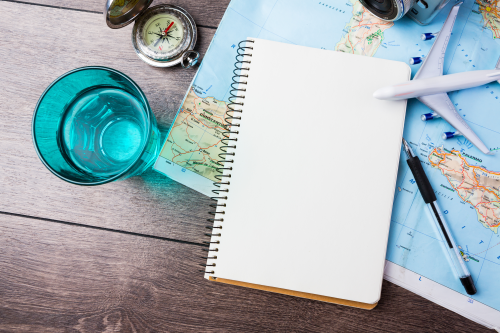

Ossetian language
Ossetian belongs to the Indo-Iranian language group. It is the mother tongue of Ossetians living in Southern Ossetia (currently in the borders of Georgia), Northern Ossetia (Russia) and Turkey. There are around half a million people able to speak Ossetian (source: RadioFreeEurope). The modern script is based on Cyrillic, but in the past, other alphabets (based on Latin and Georgian) were used.
The pronunciation of Ossetian has been highly influenced by the languages of neighbouring countries. In its vocabulary, a considerable number of Russian loanwords can be noticed. The Ossetian literature doesn’t have a long history; the first works are dated to the 18th century. Ossetian Wikipedia was only created in 2005.
Russian language in Georgia
Until 1991, Russian was present in every area of life in Georgia: in day-to-day communication, dealing with official matters or during classes in school. The situation changed dramatically after the fall of the USSR. The first democratically chosen president, Zviad Gamsakhurdia, began the process of diminishing Soviet influence. One of his actions was resigning from mandatory Russian classes. To fill the gap, many native English speakers were hired in the schools. Furthermore, after 1991, Georgian was recognized as the only official language of the state. This decision aroused controversy among the ethnic minorities who didn’t speak Georgian but used Russian, Abkhazian or Ossetian instead.
Until today, Russian is a lingua franca in the region. Usually, it is taught as a second language. It is spoken both by older and younger residents, but the last group tends to choose English more often. People working in the tourist industry often have the best knowledge of foreign languages.
Are you currently looking for a Georgian-English or Russian-English translator? Do you need the task to be completed quickly? In our translation agency, we are committed to performing assignments in the shortest time possible without compromising the quality. If you wish to learn more, please contact us!
Georgian mini-phrasebook
Let’s take a look at some useful phrases in Georgian. Those few expressions will help you during your trip to Tbilisi or Batumi. Find the courage to use them! After seeing the smile on your hosts’ faces, you will forget how hard they were to learn. Below you will find the original spelling together with the transcription.
- გამარძობათ (gamarjobat) – Hello
- დილა მშვიდობისა (dila mszvidobisa) – Good morning
- საღამო მშვიდობის (saghamo mshvidobisa) – Good evening
- ღამე მშვიდობისა (ghame mshvidobisa) – Good night
- ნახვამდის (nakhvamdis) – Goodbye
- ხვალამდე (khvalamde) – See you tomorrow
- მადლობა (madloba) – Thank you
- ინებეთ (inebet) – Here you are
- გთხოვ (gtkhov) – Please
- მე ბოდიში (me bodishi) – I’m sorry
- რა გქვია? (ra gkvia?) – What’s your name?
- მე მქვია (me mkvia) – My name is
- მე ვარ გაერთიანებული სამეფოდან (me var gaertianebuli samepodan) – I’m from the United Kingdom
- ინგლისურად ლაპარაკობ? (inglisurad lap’arak’ob?) – Do you speak English?
- არ მესმის (ar mesmis) – I don’t understand
- როგორ ხარ? (rogora khar?) – How are you?
- კი (ki) – Yes
- არა (ara) – No
Georgia – a land of honey and wine
A language is much more than just words and grammar; we can’t forget about the people who speak it. If you like Georgian, don’t hesitate to visit the Caucasian country and get to know its residents. We are sure that you will learn many interesting phrases during your journey, listen to the most beautiful national songs and dance to local music. Don’t leave without trying Georgian cuisine, wine, and sweets!



